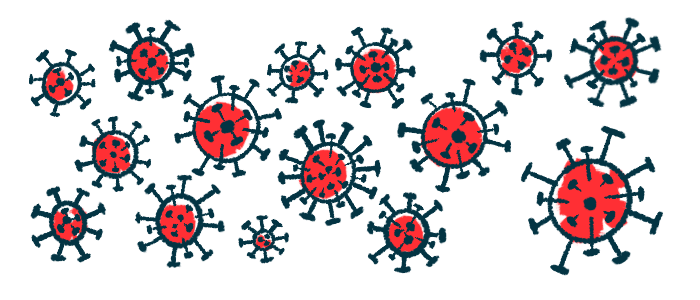No long-term COVID-19 impact on cystic fibrosis health outcomes
Researchers studied infection's effect on lung function, nutritional status
Written by |

Having COVID-19 had no clinically meaningful impact on lung function and nutritional status for people with cystic fibrosis in the year after an infection, a study across 33 countries indicates.
According to the researchers, the “study is [a] global representation of the impact of COVID-19 on the health of people living with CF, including many countries traditionally not well represented in the published CF literature.”
The study, “Impact of COVID-19 infection on lung function and nutritional status amongst individuals with cystic fibrosis: A global cohort study,” was published in the Journal of Cystic Fibrosis.
Respiratory and digestive issues are hallmark CF symptoms. Whereas chronic bacterial infections are common, viral infections can result in significant complications.
Assessments of SARS-CoV-2, the virus that causes COVID-19, on the health of people with CF have focused primarily on describing the acute impact of the infection, with early pandemic data indicating hospitalization rates were higher among CF patients than the general population. Mortality and the rate of complications were lower than initially feared, however.
Long-term health outcomes after infection
Still, the “effect of COVID-19 infection on long-term health outcomes is less well-defined,” wrote researchers from 33 countries who studied the impact of an infection with the virus on the trajectory of lung function and nutritional status of CF patients. A total of 6,500 cases of COVID-19 in CF patients from January 2020 to December 2021 were analyzed, with 344 patients (5.3%) having more than one infection.
The patients had a median age of 21, were mainly white (87.4%), and most had at least one F508del mutation (81.3%) the most common CF-causing mutation.
Based on available measurements, 3,957 patients had at least one lung function measurement before and after a COVID-19 infection. Lung function was assessed by analyzing percentage predicted forced expiratory volume in one second (ppFEV1), or how much air a patient can exhale in that time.
Mean ppFEV1 increased by 1.4% after the infection (79% pre- and 80.4% post-infection) and remained unchanged in patients on Trikafta (elexacaftor/tezacaftor/ivacaftor). However, when only low-medium income countries were considered, which accounted for about 8% of the cases analyzed, mean ppFEV1 decreased by 3.8% after an infection. A slight decrease of 0.6% was reported in patients not on CFTR modulators, which include Trikafta.
No statistically significant differences in the rate of change in ppFEV1 were seen before and after infection in participants on Trikafta or who weren’t receiving a CFTR modulator. All rate of change analyses in the study took into account sex, age, infection year, and income status of the country.
Mean BMI, a measure of body fat based on height and weight, increased from 23.7 kg per square meters (kg/m2) before an infection to 24.1 kg/m2 after an infection in adults among the 4,545 patients who had body mass index (BMI) data collected pre- and post-infection. In children, BMI percentile (an assessment of BMI compared to children of the same age and sex) indicated an increase from 56% to 58.9%, a 2.9% increase. Patients underweight at the time of a COVID-19 infection showed a greater increase of 7.5%. There was a statistically significant reduction in the rate of change in BMI, that is, a lesser gain in BMI per year, after infection in both adults and children treated with Trikafta.
According to the researchers, “this attenuation likely represents a plateauing that follows the increase in weight seen after initiating [Trikafta], likely unrelated to the COVID-19 infection.”
No “clinically meaningful impact on lung function and BMI trajectory in the year following infection with COVID-19 was identified,” the researchers wrote. “This work highlights the ability of the global CF community to unify and address critical issues facing [people with CF].”







